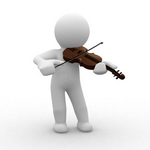Today’s title is a quote from legendary jazz artist Byard Lancaster who died in 2012 of cancer and in the wake of yet another school shooting tragedy, his quote cuts to the quick with the problems related to a society that sees culture as a luxury rather than a basic building block of becoming a happy and healthy member of society.
 Neo Classical’s author, Holly Mulcahy, wrote about this very point following a school shooting last September. In her article, she referenced Lancaster’s quote as well as a letter written to the L.A. District Elementary Schools by fellow Inside The Arts author and world renowned cellist Lynn Harrell, pleading with them not to cut art and music programs.
Neo Classical’s author, Holly Mulcahy, wrote about this very point following a school shooting last September. In her article, she referenced Lancaster’s quote as well as a letter written to the L.A. District Elementary Schools by fellow Inside The Arts author and world renowned cellist Lynn Harrell, pleading with them not to cut art and music programs.
Harrell is no stranger to the positive impact music and art possess as a coping mechanism. Two years ago, Harrell and his wife, violinist Helen Nightengale, co-founded the HEARTbeats Foundation, a charity to develop programs that use music to help children in need better cope with, and recover from, the extreme challenges of poverty and conflict.
It’s been my honor to serve as a founding member of the HEARTbeats Foundation executive board and we’re in the process of raising the funds needed to establish a year-round program that provides direct services to children and families of need in the form of on-site musical and artistic involvement within a therapeutic context. The services are specially designed to build lifelong skills that will help recipients express grief, improve their emotional well being, and build resilience to overcome environmental challenges.
Once funding is secured, we can set a wonderful partnership in motion with Temple University that will allow us to document our work and confidently demonstrate that these efforts have a tangible impact on the well being of individuals and entire communities.
Last week’s tragedy reinforces the need to get this program up and running more than ever. Moreover, it demonstrates the need in our own country to realize that if we continue down a path where our educational culture is devoid of music and art, we can only expect more of the same.
You can help HEARTbeats reach the $60,000 fundraising goal we need to set our program in motion by making a donation from their website, heartbeatsforchildren.org, just look for the PayPal donate button at the bottom of every page. You can also learn more about the children we’re working with from the blog we maintained during our last trip to Nepal.
Lastly, I hope everyone takes the time to reach out to your local, state, and national representatives to insist that music and arts have a permanent, and year-round, place in the education of each child during each and every year of their scholastic career.



I certainly see this as a much more plausible reason than the one espoused by a former Presidential candidate who said that it’s because “we’ve taken God out of our schools”. I’m not trying to start a flame war, just saying what I think. Music is so much bigger than the politics of religion.
That’s an excellent query Sarah and it reminds me of a similar question presented to the HEARTbeats Foundation from a donor which my fellow board member Neil Comess-Daniels composed the following eloquent reply and I am posting it here with his permission.
A given individual involved with HEARTbeats may, internally, frame his/her inspiration for his/her contribution to our work in spiritual or religious terms, as, of course, is their right. However neither of these approaches are officially part of what we do and overt or even unintentional proselytizing of any religious perspective is beyond the pale for us because such expressions are an impediment to what we want to accomplish.
What binds us together at HEARTbeats and gives us our mission are the spiritual, healing and supportive experiences we know we can give to others through music. Music enables us to disarm the divisiveness that can often accompany religious motivations. We use music to express respect for all individuals and all spiritual approaches. I would say that we of HEARTbeats “believe” in music and the good it can do, especially for children. Music is the religion of HEARTbeats.
~ Neil Comess-Daniels
You can read Neil’s bio and his statement of purpose about why he’s involvement with HEARTbeats at the the foundation’s website. And it’s worth mentioning at this point, Neil has been the Rabbi at Beth Shir Shalom in Santa Monica, California since 1991.
Well, I have always been moved by music and it is not being too extreme to say that my re-discovery of classical music – including the many wonderful Twin Cities experiences – helped to save my life about five years ago. I alternate between passion and despair these days with what I am trying to do to help save the music in return.
Hello, I must agree with you. One of the best things that ever happened to me when I was a student way back when was music class. It turned on a roaring fire that has not yet subsided in my life (and I’m almost 56). While I did not go on to play trombone professionally, I really found that I had a deeper love for the technology side of making music and I became a sound engineer instead. This gives me the best of two worlds: I can listen to players, yet I don’t have to be self-critical of how I played. Yet, now the tide has turned to supporting sports and everything but arts and especially music. Why? Schools claim there is NO MONEY support available! No, I think the true answer is they don’t want to put effort into support of a critical thing for a student’s well-being. they’d rather see athletic programs supported EN MASSE and not realize there is a critical balance being weighed. Yes, sports are necessary, but very few (even fewer in athletics) make it as professional players and then it’s only until mid life. With music, a professional might lose the sense of hearing or maybe get Carpal Tunnel Syndrome, but rarely does it happen. What does happen though is the ability to carry on a career until way past mid-life and do it very well. Of course, one does need to have talent, discipline and other factors to be professional (Same is true in sports buck-o!) but the chance that a professional musician can be reared is excellent. One can be a musician as well as another professional too. Look at all the bar bands out there , not to mention the judges, lawyers, doctors, teachers, etc. that play in orchestras or bands as a second career. (This is where Symphony Boards get confused as to whether members are full or part time) Music knows no boundaries, but it does need players to bring it to the rest of us. The best place I know to find out how you would react to music is school an participating in a band, orchestra or choir in addition to general music classes. It also can influence other areas of study as well as other areas of your life such as how you dress for an occasion. In short, music can be a great teacher as well as leveler of how life goes. But it has to be given an equal footing in school curriculums. It cannot be short changed. I therefore believe all people who are concerned about this, should approach their district school boards and ask/demand that funding be restored for arts and music programming and that these programs should be equal with athletics, not in a dismal second.
In the end, while sports can entertain, music can go o so much more deeper in its ability to reach us all and can carry us far better into a better way of living. It’s also a lot less violent than one thinks.